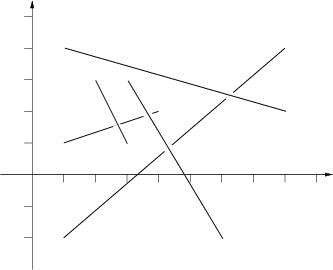Segment set
Time Limit : 3000/1000ms (Java/Other) Memory Limit : 32768/32768K (Java/Other)
Total Submission(s) : 12 Accepted Submission(s) : 4
Font: Times New Roman | Verdana | Georgia
Font Size: ← →
Problem Description
A segment and all segments which are connected with it compose a segment set. The size of a segment set is the number of segments in it. The problem is to find the size of some segment set.


Input
In the first line there is an integer t - the number of test
case. For each test case in first line there is an integer n (n<=1000) - the
number of commands.
There are two different commands described in different format shown below:
P x1 y1 x2 y2 - paint a segment whose coordinates of the two endpoints are (x1,y1),(x2,y2).
Q k - query the size of the segment set which contains the k-th segment.
k is between 1 and the number of segments in the moment. There is no segment in the plane at first, so the first command is always a P-command.
There are two different commands described in different format shown below:
P x1 y1 x2 y2 - paint a segment whose coordinates of the two endpoints are (x1,y1),(x2,y2).
Q k - query the size of the segment set which contains the k-th segment.
k is between 1 and the number of segments in the moment. There is no segment in the plane at first, so the first command is always a P-command.
Output
For each Q-command, output the answer. There is a blank line
between test cases.
Sample Input
1 10 P 1.00 1.00 4.00 2.00 P 1.00 -2.00 8.00 4.00 Q 1 P 2.00 3.00 3.00 1.00 Q 1 Q 3 P 1.00 4.00 8.00 2.00 Q 2 P 3.00 3.00 6.00 -2.00 Q 5
Sample Output
1 2 2 2 5
http://pic002.cnblogs.com/images/2011/287127/2011080416290750.jpg

如果 p1 × p2 为正数,则相对原点(0,0)来说, p1 在p 2 的顺时针方向; 如果p 1 × p2为负数,则p 1 在p 2 的逆时针方向。如果p 1× p2 =0,则p 1和p 2 模相等且共线,方向相同或相反。
#include <iostream> #include<algorithm> using namespace std; struct node { double x,y; }dian1[1000],dian2[1000]; int par[1005]; int num[1005]; int findi(int x) { if(par[x]==x) return x; return par[x]=findi(par[x]); } void unioni(int x,int y) { int xx=findi(x); int yy=findi(y); if(xx!=yy) { par[xx]=yy; num[yy]=num[xx]+num[yy]; } } double diancheng(node a,node b,node c) { return (b.x-a.x)*(c.y-a.y)-(b.y-a.y)*(c.x-a.x); } int panduan(node a,node b,node c, node d) { int minpx=min(a.x,b.x); int minpy=min(a.y,b.y); int minqx=min(c.x,d.x); int minqy=min(c.y,d.y); int minux=max(minpx,minqx); int minuy=max(minpy,minqy); int maxpx=max(a.x,b.x); int maxpy=max(a.y,b.y); int maxqx=max(c.x,d.x); int maxqy=max(c.y,d.y); int maxux=min(maxpx,maxqx); int maxuy=min(maxpy,maxqy); if(minux>maxux||minuy>maxuy) return 0; if(diancheng(a,b,c)*diancheng(a,b,d)>0) return 0; if(diancheng(c,d,b)*diancheng(c,d,a)>0) return 0; return 1; } int main() { int T; cin>>T; while(T--) { int n; cin>>n; for(int i=0;i<=n;i++) { par[i]=i; num[i]=1; } char a; int k=1; while(n--) { cin>>a; if(a=='P') { cin>>dian1[k].x>>dian1[k].y>>dian2[k].x>>dian2[k].y; for(int i=1;i<k;i++) { if(panduan(dian1[i],dian2[i],dian1[k],dian2[k])) { unioni(i,k); } } k++; } else { int p; cin>>p; int pp=findi(p); cout<<num[pp]<<endl; } } if(T) cout<<endl; } return 0; }
一开始没明白为什么跨立实验就可以解决 为什么要用快速排斥
应为点乘等于0;有3种可能。

而通过了快速排斥试验,所以上图左边的情况是不可能出现的,只会出现右边的两种情况。
左右2种都是 满足相交
